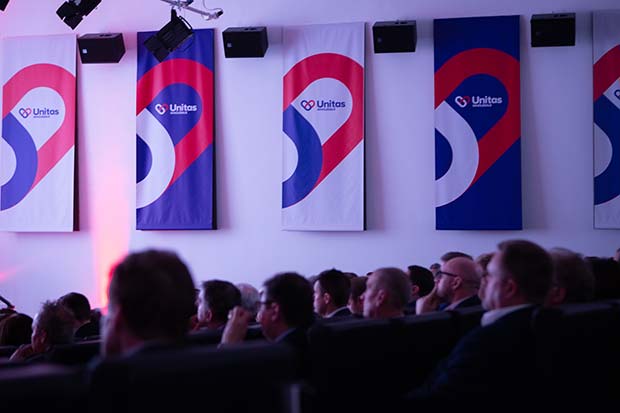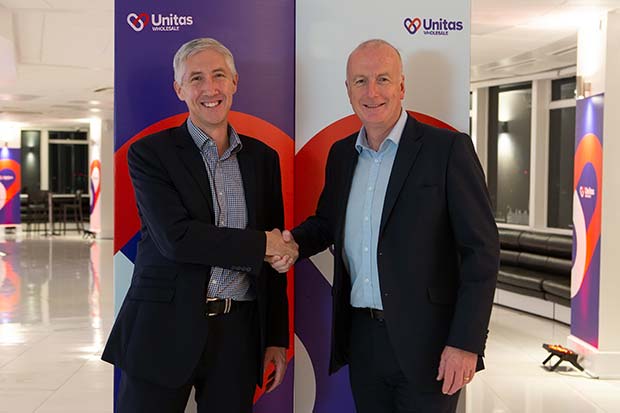Formed in this autumn’s merger of Landmark and Today’s, Unitas Wholesale is now up and running as the UK’s largest wholesale services company, and on a declared mission to become a champion of independents and a champion of brands, dedicated to supporting the 179 or so independent member wholesalers and at the same time offer suppliers a more efficient route to their customers.
 The group’s new management team recently held a conference for their main suppliers to explain their new approach. Afterwards Darren Goldney, MD of Unitas Wholesale spoke to Wholesale Manager:
The group’s new management team recently held a conference for their main suppliers to explain their new approach. Afterwards Darren Goldney, MD of Unitas Wholesale spoke to Wholesale Manager:
“We’ve had a great reaction to the new proposition, and it’s clear that people can understand our objectives. Our mission is to become the champion of independents and the champion of brands, and in doing so, improve our efficiency and effectiveness. In short, we want the business to cost less and sell more. And, as MD, if we’re not achieving this, I’m not doing my job.
“We have a fantastic team who ensure we’re pointing in the right direction and our efforts are aligned between the suppliers’ central offices and our buyers.”
The name Unitas was chosen to convey a sense of unity: “Day to day I talk to members and suppliers about what we need to do. I feel passionately that the new structure makes us easy to deal with and our members, big and small, will benefit.”
Unitas Wholesale has three business development managers out on the road, whose job is to see the members, understand their business and see how other central services can help, from forklift trucks through to impulse products. The new organisation comes into being at a time of change for wholesaling, says Darren:
“Various smaller wholesalers have disappeared in recent months, including a specialist wine company. A number of wholesalers have merged because they were finding the landscape difficult and another one has absorbed a second. Some big ones have also gone out of business, Palmer and Harvey and Conviviality for example, while Blakemore’s cash and carry division has been sold. As Tesco, Amazon and so on come in, we have to change the model.”
 New companies are always moving into this sector, says Darren, but existing ones are going out faster than usual: “Historically, the nine major buying groups haven’t always been fast to react, but things have changed. From the announcement that Landmark and Today’s were planning to merge it was just three months to implementation.
New companies are always moving into this sector, says Darren, but existing ones are going out faster than usual: “Historically, the nine major buying groups haven’t always been fast to react, but things have changed. From the announcement that Landmark and Today’s were planning to merge it was just three months to implementation.
It’s been the fastest and most progressive period you can imagine. “At Unitas Wholesale we are moving quickly and we’ll get it ninety percent right, but if we waited to get to one hundred percent, we risk missing a trick.”
Before the merger Darren says there was “a lot of cultural misunderstanding” between Landmark and Today’s members and the head offices, “but now we’re working as a team.”
Unitas Wholesale’s headquarters is in Doncaster. Darren explains: “After much heart searching, we chose the old Today’s office based on efficiency. We rebranded it overnight and when the staff came in on November 1st it was Unitas Wholesale throughout.”
The publicly declared Unitas Wholesale pitch to suppliers is that they are aiming to be first choice business partner for suppliers in the independent convenience sector, based on being the most efficient route to market:
“Before this, there were nine buying groups and a supplier had to deal with them all individually. If we can consolidate that, great! We’ve brought together the biggest two groups and we’re collating score cards so the key suppliers know where they stand on availability and financial standards and our members can see the supplier is fully committed at the centre.”
The members will always be independent businesses, says Darren: “Unitas Wholesale doesn’t own them. Where there is similarity and duplication, they want commonality:
where there’s local differentiation, their knowledge and experience comes to the fore. They know their customers.”
The industry has changed a lot since Darren first came into it in the 1980s: “When I started there were companies like Mojo and M6 and significant fragmentation. Now there’s consolidation to the point where Tesco, Morrisons and Amazon are bringing the leverage of big retail into wholesale.”

Some of the old style small wholesalers still exist, says Darren, but the needs of customers have changed: “If you look at the other buying groups, there are still hundreds of small wholesalers around. The ones with a specialism can survive, but general grocery wholesalers find it hard as c-stores’ requirements have moved on. In the old days, it was all ambient led but now customers want chilled, fresh and the high standards you’d find in a supermarket.”
Darren says Unitas Wholesale is based on a ‘cultural shift’ towards a combined buying and selling capability: “Buying groups clubbed together before, however in the modern era it’s the scale you can achieve that is of value. The blue chip suppliers are as interested in scale as capability. They know what trading environment they want to be in, but don’t have the means to get there, and they want a route to market that adds value.
“Our job is to make sure all our initiatives offer that, giving as much value as possible. It’s been happening, only with Unitas Wholesale we’re accelerating it.”
Darren has worked closely over the years with the FWD and the Scottish Wholesale Association: “I think they want to keep an independent perspective on this, and anything that helps wholesaling, as we’re doing, is welcome. Our members will continue to be part of both groups, so there’s no reason to be anything other than positive.”
The big question is, how will Unitas Wholesale deal with the suppliers they know are supplying Tesco/Bookers? “We have no agenda to try and preclude or curtail suppliers’ dealings with competitors. Tesco and Aldi will remain critical routes to market for some, but while the market consolidation continues at this rate with the volume growth of the big competitors, independent wholesalers are being squeezed. However, the multiples are growing and the emphasis on brands in the multiples is nowhere as strong as it is with us. If you’re a supplier with a branded footprint, you want wholesalers to grow so you’ll work with us.”
Another important point is that the multiples aren’t just competing with the independents, says Darren, they’re also competing with restaurants and pubs for food and drink sales: “Long term, as wholesalers they have a strategic need to give growth to the people who aren’t going to compete with them.”
Within the Unitas Wholesale model, says Darren, brands represent more than 99% of the product footprint, “but we still have a focused own label portfolio. Taking tomato sauce as an example, a cstore with no local competition only needs to stock the brand leader but if they’re near a Tesco or an Aldi, they also need an entry price point.”
It’s not difficult for new suppliers to get on the Unitas Wholesale roster, says Darren: “They just need to come and see us. Under the old system, suppliers had to knock on a lot of doors, but we’ve taken out duplicated roles, we’re better resourced and we now have more time to talk to a wider range of suppliers, who only have to come to one place to access all our members.”
Unitas Wholesale includes some pretty high-profile names, who are in it for a common purpose: “All our members bought into the merger because they see the real competition as Amazon, Tesco, Bidfood, Brakes and Matthew Clarke, so pooling resources makes us more competitive. Yes, our members compete but they do it at local level. We benchmark competitiveness, working with suppliers more competitively, getting it right and putting energy into local activity.”
Unitas Wholesale will be keeping the different existing retail fascias, says Darren: “The members’ retailers felt this was critical. Fascias and store refits are expensive: stores are branded and having invested, retailers didn’t want to change. They need a local point of difference. We will provide them with different fascias for a local USP but a commonality of offer, so they get the best of both worlds.”
Under the existing Today’s Plan For Profit programme the Unitas Wholesale single core range will cover 800 SKUs across all categories:
“Range reviews used to be an annual exercise and retailers had struggled to implement all the advice, but we’ve made it more manageable with three per year: Impulse, Grocery and Dry Packaged.”
Darren thinks being able to negotiate a common promotional schedule across all fascias and retail clubs will be a powerful mechanism for suppliers:
“We have seven thousand stores across our symbol and retail club programme, and only a finite number of promotional slots. The challenge is, suppliers want to be on the schedule with the right product at the right price, so it’s about balancing the products and leaflets with what consumers want.”
Compliance will be a big driver for Unitas Wholesale, says Darren: “Landmark Wholesale and Today’s Group focused on compliance differently, sending third-party sales people to visit stores. Landmark had an incentive voucher system, which we’re looking to roll out and adopt.”
Compliance is expensive to measure. Unitas Wholesale currently has an EPOS trial running, pulling several hundred retailers’ data and in Q1 of 2019 the wholesalers’ depots will go through a self-compliance process when they show their retail customers what’s on offer in the core range, before it rolls out into their stores.
Unitas Wholesale’s new digital tools for suppliers sound excellent, the optimum distribution tool identifying the best range of SKUs to put into member depots and the service tracking tool to monitor service levels. But won’t competitor companies disagree and say their product should go in, and not someone else’s? Darren is firm on this:
“Competitors disagreeing is valid but our job is to be the honest broker. Our profiling tools will lift the lid for suppliers and provide them with invaluable insight into where their products go. For example, if a supplier wants to target coffee shops, we can point to specific wholesalers with that particular expertise. Letting suppliers know our customer base can only add value for them.
“Similarly, promotional investment is straightforward these days, but if suppliers have investment priorities we want to make those opportunities even better. It all comes down to making life easier for our suppliers so they sell more.”
It’s an impressive pitch. From here on in, Darren and the Unitas Wholesale team will be implementing their 12- month plan, with its 10-point consolidation programme. The events schedule is already out and they are meeting suppliers to talk in detail about the rest of the package in December and January. We wish them well.




Comments are closed.